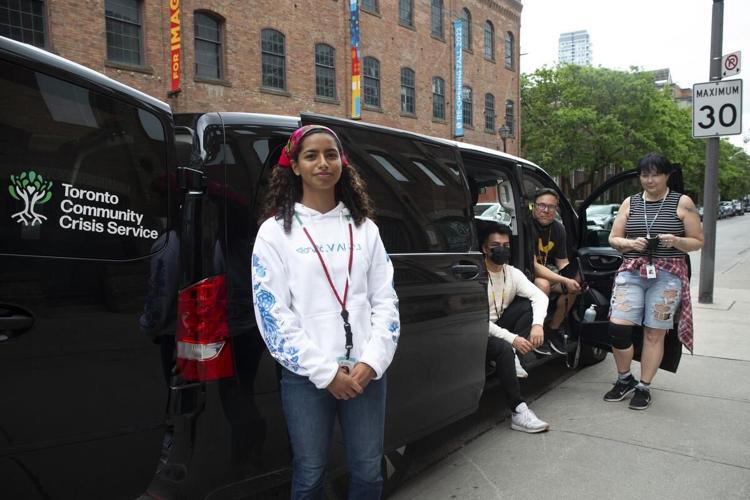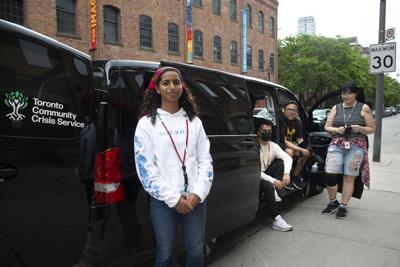If youãre experiencing a mental health crisis or see someone who is, Saige McMahon wants you to think twice about calling 911.
If you live in downtown west pc28¿ìë½ã from around South Parkdale to Waterfront Communities and up to the Annex and Christie-Ossington neighbourhoods ã and need a non-emergency wellness check or assistance, try calling 211 instead.
Instead of being connected with police ã who have long been criticized for their handling of mental health calls ã youãll reach a new Indigenous-led crisis response team comprised of nurses, crisis support workers, case managers and community resource specialists.
ãPolice donãt have the capacity to provide holistic support for individuals in crisis. Theyãre not made to get people into shelter and provide them with counselling and mental health services,ã said McMahon, the director of the Indigenous-led pilot.
Named in tandem with Indigenous language and knowledge keepers, Kamaamwizme wii Naagidiwendiiying, which means ãComing together to heal/look after/take care of each otherã in Anishinaabemowin, the team brings a new option to assist residents in this area, which is usually serviced by pc28¿ìë½policeãs 14 Division.
ã(Our services are) consensual, community-led and trauma-informed. We really centre the individualãs needs and walk alongside them,ã said McMahon.
The new team is Indigenous-led, but hopes to serve all community members in their catchment area 24 hours a day, seven days a week, she said.
The extension of this crisis pilot into west downtown is a partnership between Findhelp which operates the 211 line across the province, , the and and is one of four pc28¿ìë½Community Crisis Service teams, some of which launched earlier this year.
These teams (TCCS), the first of their kind in the province, send nurses and mental health support workers in place of police officers to respond to 911 calls for people in crisis. They received unanimous approval from city council last year after growing protests against police brutality and the death of Regis Korchinski-Paquet, an Afro-Indigenous pc28¿ìë½woman who died in police presence during a mental health crisis call in May 2020.
Three other pilots in collaboration with other community partners are running in the cityãs
Itãs a new project, but itãs not a new concept.
ãI think longer than there have been conversations at a city-level, thereãs been a need,ã said McMahon. ãWithin the Indigenous community, this is something weãve been talking about and something that weãve been doing for generations.ã

Saige McMahon is the director of the newly launched pilot, an Indigenous-led crisis support service team with Two Spirited People of the First Nations that was unanimously approved by pc28¿ìë½City Council in 2021.
Paige Taylor WhiteThe downtown west team currently has about 30 members and uses a nonenforcement approach, meaning all of the care the individual receives is on their own terms, whether it be referrals to mental health services and hospitals or traditional Indigenous supports. Members stay with the individual, whether itãs for 45 minutes, four hours, or more, depending on their needs.
From there, a case manager may be assigned to the individual to provide aftercare and follow up with long-term processes like employment, housing, food and clothing supports, among others.
Typically, police would be the first responders for crisis situations. But having police on the scene hasnãt always made those affected feel safe in their presence, McMahon said. There had to be another solution.
ãWe know that (police response) has caused a lot of violence for communities, specifically for marginalized communities,ã she said.
The line is accessible to all residents, but having an Indigenous-led line is especially needed because of how Indigenous peoples are often treated by police and other public service workers.
That treatment has been confirmed by a recent report from pc28¿ìë½Police Service which found Indigenous people were 1.4 times more likely to be subjected to force during calls regarding a person in crisis. Indigenous peoples also showed the highest overrepresentation in strip searches.
Indigenous folks across Turtle Island have been both over and underpoliced, McMahon said, as evident through higher incarceration rates but also a lack of movement to address the missing and murdered Indigenous women and girls crisis, which McMahon says is a ãresult of under-policing.ã
Because of this, and due to other structures in society that marginalize Indigenous people, community members donãt feel safe calling 911 in a crisis, she said. For instance, out of fear of their children being removed from their homes or the treatment theyãll receive if theyãre visibly Indigenous.
ã(The community) wanted options where they could feel safe. They wanted options where the approach understood the history of this land,ã said McMahon, a history that includes acknowledging systemic issues like homelessness and other byproducts of colonialism, she added.
And having Two Spirit involvement in the program ã Indigenous folks who carry both a masculine and feminine spirit who were and continue to be an important part of Indigenous communities and Nations, often acting as mediators, caretakers, teachers and medicine people ã ãpeople who are calling in to access these services feel like theyãre represented by the people who are there to support them,ã McMahon said.
This new option for people in crisis is available, but it will take some time before the service becomes ubiquitous, she said, highlighting the importance of community outreach for the next while.
With the new pilot, if callers do dial 911 for crisis intervention, they may still be connected to 211 and the services Kamaamwizme wii Naagidiwendiiying provides if the operator dispatches them.
ãIf we can reduce the amount of police violence that folks who are experiencing mental-health-related crises are facing, especially within BIPOC communities, thatãs really important,ã McMahon said.
Correction ã July 22, 2022: This article was updated to correct the name of the pc28¿ìë½Community Crisis Service, clarify 211ãs involvement and that the program is tailored to responding to mental health crises.
With files from Nadine Yousif and Wendy Gillis































To join the conversation set a first and last name in your user profile.
Sign in or register for free to join the Conversation